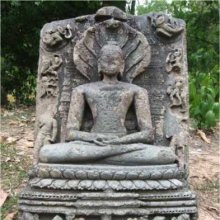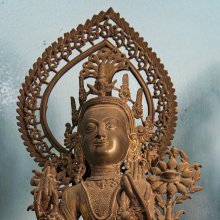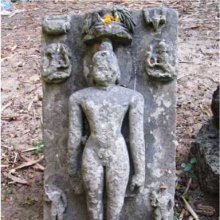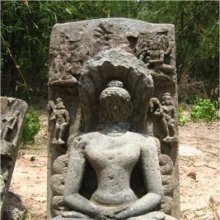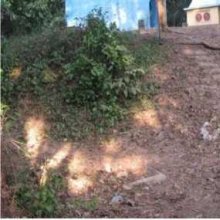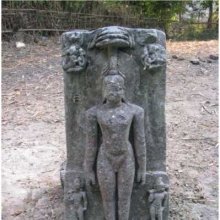Ata, Āṭa, Aṭā: 18 definitions
Introduction:
Ata means something in Buddhism, Pali, Hinduism, Sanskrit, Marathi, Hindi, biology, Tamil. If you want to know the exact meaning, history, etymology or English translation of this term then check out the descriptions on this page. Add your comment or reference to a book if you want to contribute to this summary article.
Alternative spellings of this word include Aata.
Images (photo gallery)
(+51 more images available)
In Hinduism
Shaivism (Shaiva philosophy)
Source: Brill: Śaivism and the Tantric TraditionsAṭa (अट) refers to “wandering” [?], according to the Guhyasūtra chapter 3.—Accordingly, “[...] One may perform the Block-of-Wood Observance in a forest full of bears, tigers and lions, conquering the urges to sleep and eat, [constantly] reciting. If one takes on the appearance of a woman and sings and dances, adorned with bracelets, with a winnowing fan, ball and plait, one observes the Colourful Observance. With a weapon in hand, full of compassion, if one wanders (aṭa) like a saviour of creatures (?) focussed upon recitation, meditation and worship, one performs the Warrior Observance. [...]”.

Shaiva (शैव, śaiva) or Shaivism (śaivism) represents a tradition of Hinduism worshiping Shiva as the supreme being. Closely related to Shaktism, Shaiva literature includes a range of scriptures, including Tantras, while the root of this tradition may be traced back to the ancient Vedas.
In Buddhism
Mahayana (major branch of Buddhism)
Source: archive.org: Bulletin of the French School of the Far East (volume 5)Aṭa (अट) (in Chinese: A-tch'a) is the name of an ancient kingdom associated with Rohiṇī or Rohiṇīnakṣatra, as mentioned in chapter 18 of the Candragarbha: the 55th section of the Mahāsaṃnipāta-sūtra, a large compilation of Sūtras (texts) in Mahāyāna Buddhism partly available in Sanskrit, Tibetan and Chinese.—Chapter 18 deals with geographical astrology and, in conversation with Brahmarāja and others, Buddha explains how he entrusts the Nakṣatras [e.g., Rohiṇī] with a group of kingdoms [e.g., Aṭa] for the sake of protection and prosperity.

Mahayana (महायान, mahāyāna) is a major branch of Buddhism focusing on the path of a Bodhisattva (spiritual aspirants/ enlightened beings). Extant literature is vast and primarely composed in the Sanskrit language. There are many sūtras of which some of the earliest are the various Prajñāpāramitā sūtras.
Biology (plants and animals)
Source: Google Books: CRC World Dictionary (Regional names)1) Ata in Benin is the name of a plant defined with Aframomum melegueta in various botanical sources. This page contains potential references in Ayurveda, modern medicine, and other folk traditions or local practices It has the synonym Cardamomum grana-paradisi Kuntze (among others).
2) Ata in Ghana is also identified with Pentaclethra macrophylla It has the synonym Harpalyce macrocarpa Britton & P. Wilson.
3) Ata in India is also identified with Annona squamosa It has the synonym Xylopia frutescens Sieb. ex Presl, nom. illeg. (etc.).
4) Ata is also identified with Anodendron paniculatum It has the synonym Echites polyanthus Wall., nom. inval. (etc.).
5) Ata is also identified with Antidesma ghaesembilla.
6) Ata in Indonesia is also identified with Smilax odoratissima.
7) Ata in Nigeria is also identified with Celosia trigyna It has the synonym Digera alternifolia (L.) Asch. (etc.).
8) Ata is also identified with Imperata cylindrica It has the synonym Calamagrostis lagurus (L.) Koeler (etc.).
9) Ata is also identified with Xylopia aethiopica It has the synonym Xylopicrum aethiopicum (Dunkley) Kuntze (etc.).
10) Ata is also identified with Zanthoxylum zanthoxyloides It has the synonym Fagara senegalensis (DC.) A. Chev. (etc.).
Example references for further research on medicinal uses or toxicity (see latin names for full list):
· Icones et Descriptiones Plantarum, quae aut sponte … (1794)
· Mém. Soc. Phys. Genève (1832)
· Enumeratio Plantarum Zeylaniae (1860)
· Annali di Botanica (1987)
· Journal of Ethnopharmacology (2006)
· Fitoterapia (2003)
If you are looking for specific details regarding Ata, for example diet and recipes, side effects, health benefits, pregnancy safety, chemical composition, extract dosage, have a look at these references.

This sections includes definitions from the five kingdoms of living things: Animals, Plants, Fungi, Protists and Monera. It will include both the official binomial nomenclature (scientific names usually in Latin) as well as regional spellings and variants.
Languages of India and abroad
Pali-English dictionary
Source: Sutta: The Pali Text Society's Pali-English DictionaryĀṭa, (etym. ? Cp. Sk. āṭi Turdus Ginginianus, see Aufrecht, Halāyudha p. 148) a kind of bird J. VI, 539 (= dabbimukha C.). (Page 97)

Pali is the language of the Tipiṭaka, which is the sacred canon of Theravāda Buddhism and contains much of the Buddha’s speech. Closeley related to Sanskrit, both languages are used interchangeably between religions.
Marathi-English dictionary
Source: DDSA: The Molesworth Marathi and English Dictionaryaṭa (अट).—f An obstruction; a bar, let, impediment, lit. fig. 2 A stone &c. put under a wheel to scotch it. 3 (fig. A let or hinderance to unfaithfulness.) Forfeit or penalty, as attached to engagements. 4 Stubbornness or obstinacy. v dhara. 5 The bridge of a vīṇā or similar instrument. 6 A bar, nail, stone &c. used as a lever. 7 A catch or ravel (of a rope or string), a tangle, a snarl. Hence, fig. a knot in the mind; a prejudice against. 8 The water which flows on (in a pāṭa or channel) after stoppage of the mōṭa or other source. (Quasi, aṭata aṭata jēṃ pāṇī.) Ex. ēvaḍhyā aṭīnēṃ vāphā bharēla mōṭa ubhī kara. 9 m A member of the loom. The notched or channeled stick fastened before the paradēśī. Used to widen or open out the threads. 10 f At marbles. The thumb depressed to support the hand and fingers in the position to shoot: also the spot on which this down-pointing thumb rests.
--- OR ---
āṭa (आट).—f Obstinacy &c. See aṭa.
--- OR ---
āṭa (आट).—f Teasing &c. See aṭa, aṭāghāṭa &c.
--- OR ---
āṭa (आट).—f Grit of rice boiled and mixed up with flour. 2 f m A term of the loom. The instrument of pressing home the woven portion of a web.
--- OR ---
āṭā (आटा).—m A hoop or ring; any annular or circular binding;--as that around a barrel, drum, musket &c.; a boys' hoop; a mountebank's hoop, a pail-carrier's hoop. 2 A turn (around a post &c.) with a rope. 3 R The frame of a chatrī or iralēṃ.
--- OR ---
āta (आत).—f A father's sister. 2 n ( H) A custard-apple.
Source: DDSA: The Aryabhusan school dictionary, Marathi-Englishaṭa (अट).—f Hindrance. Condition. Obstinacy.
--- OR ---
āṭa (आट).—f Obstinacy. Teasing. Grit of rice boiled and mixed up with flour. See aṭa.
--- OR ---
āṭā (आटा).—m A hoop; a turn with a rope.
--- OR ---
āta (आत).—f A father's sister. n A custard-apple.
Marathi is an Indo-European language having over 70 million native speakers people in (predominantly) Maharashtra India. Marathi, like many other Indo-Aryan languages, evolved from early forms of Prakrit, which itself is a subset of Sanskrit, one of the most ancient languages of the world.
Sanskrit dictionary
Source: DDSA: The practical Sanskrit-English dictionaryAṭa (अट).—a. Wandering; क्षपाटः (kṣapāṭaḥ) a night-roamer. ततः क्षपाटैः पृथुपिङ्गलाक्षैः खमानशे (tataḥ kṣapāṭaiḥ pṛthupiṅgalākṣaiḥ khamānaśe) Bk 2.3.
--- OR ---
Aṭā (अटा).—[aṭ vā aṅ] The habit of roaming about (as a religious mendicant); so अ (a), अटाठ्या (aṭāṭhyā).
--- OR ---
Āta (आत).—a. [ā-at-ac] Spread around.
-taḥ Ved.
1) A quarter of the sky.
2) A scaffold.
3) The frame of a door.
Source: Cologne Digital Sanskrit Dictionaries: Shabda-Sagara Sanskrit-English DictionaryAṭa (अट).—mf.
(-ṭaḥ-ṭā) 1. Going 2. Roaming. wanderng E. aṭa, and ac aff.
Source: Cologne Digital Sanskrit Dictionaries: Cappeller Sanskrit-English DictionaryĀtā (आता).—[feminine] ([instrumental] [plural] also ātais) frame, border, edge.
Source: Cologne Digital Sanskrit Dictionaries: Monier-Williams Sanskrit-English Dictionary1) Aṭā (अटा):—[from aṭ] f. the act or habit of roaming or wandering about (especially as a religious mendicant).
2) Āṭa (आट):—mfn. (√aṭ), going, going after, only ifc. e.g. kanyāṭa, kṣapāṭa, patny-āṭa etc.
3) m. Name of a Nāga demon, [Tāṇḍya-brāhmaṇa] (cf. ātaka.)
4) Āta (आत):—[=ā-ta] [instrumental case] [plural] ā-tais See ā-tā under ā-√tan.
5) Ātā (आता):—[=ā-tā] [from ā-tan] a mf. the frame of a door, [Ṛg-veda ix, 5, 5] ([instr. [plural] ā-tais; [varia lectio] ā-tābhis [commentator or commentary] on [Nirukta, by Yāska iv, 18]]) and, [Vājasaneyi-saṃhitā xxix, 5] ([instrumental case] [plural] ā-tais)
6) [v.s. ...] ‘the frame’ id est. a quarter of the sky, [Ṛg-veda] ([nominative case] [plural] ā-tās; [locative case] [plural] ā-tāsu).
7) [=ā-tā] b and ā-tāna See ā-√tan.
Source: Cologne Digital Sanskrit Dictionaries: Goldstücker Sanskrit-English DictionaryAṭa (अट):—I. m. f. n.
(-ṭaḥ-ṭā-ṭam) Roaming, wandering. Ii. f.
(-ṭā) The roaming or wandering, esp. of a religious mendicant. E. aṭ, kṛt aff. ac.
--- OR ---
Aṭā (अटा):—f.
(-ṭā) See aṭa.
Source: Cologne Digital Sanskrit Dictionaries: Yates Sanskrit-English DictionaryAṭa (अट):—[(ṭaḥ-ṭā-ṭaṃ) m. f. n.] Wandering.
[Sanskrit to German]
Sanskrit, also spelled संस्कृतम् (saṃskṛtam), is an ancient language of India commonly seen as the grandmother of the Indo-European language family (even English!). Closely allied with Prakrit and Pali, Sanskrit is more exhaustive in both grammar and terms and has the most extensive collection of literature in the world, greatly surpassing its sister-languages Greek and Latin.
Hindi dictionary
Source: DDSA: A practical Hindi-English dictionary1) Aṭā (अटा):—(nm) a garret, an attic.
2) Ata (अत):—[=अत:] (ind) hence; therefore; thus; on this account; ~[param] now onwards, hereafter.
3) Atā (अता):—(nm) a gift; —[karanā/pharamānā] (to be so kind as) to give away, to bestow.
4) Āṭā (आटा) [Also spelled aata]:—(nm) flour; ([kaṃgālī meṃ]) —[gīlā honā] to be plunged into yet another complication when already afflicted; [āṭe ke sātha ghuna pisanā] to undergo an undeserved suffering on account of association; [āṭe-dāla kā bhāva mālūma honā] to be confronted with unwelcome realities of practical life; [āṭe-dāla kī phikra] anxiety regarding means of sustenance; [āṭe meṃ namaka] in reasonable/small proportions.
...
Kannada-English dictionary
Source: Alar: Kannada-English corpusĀṭa (ಆಟ):—
1) [noun] any form of play or way of playing; an amusement; a recreation; a sport; a play; a game.
2) [noun] a playing in turn, as in chess, gambling with dice etc.; the turn to play; a move.
3) [noun] the manner in which a chessman or the like, is moved or to be moved.
4) [noun] an exhibition of a drama, dance, cinema, etc.; a spectacle.
5) [noun] (in comp.) anything done or being done (as in ಓಡಾಟ, ಕಣೆಗಳಾಟ, ಕುಣಿದಾಟ, [odata, kanegalata, kunidata,] etc.).
6) [noun] a business dealing or affair.
7) [noun] affectation a) an affecting or pretending to like, have, etc.; a show or pretence; b) artificial behaviour meant to impress others; mannerism for effect.
8) [noun] capacity; capability.
9) [noun] ಆಟಕೊಡು [atakodu] āṭakoḍu to complete, as a participating player, the running game; ಆಟವಾಡಿಸು [atavadisu] āṭavāḍisu to cause to play; 2. to cheat; to make fool; 3. to annoy; to disturb or irritate repeatedly; ಆಟವಾಡು [atavadu] āṭavāḍu to play; 2. to use tricks, deceits or evasions; to dodge; to be shifty; ಆಟತಣ್ಣಗಾಗು [atatannagagu] āta taṇṇagāgu one’s activity, trick, game-plan to become ineffective; ಆಟದ ಬೊಂಬೆ [atada bombe] āṭada bombe a doll to play with; 2. a person whose actions, ideas, etc. are controlled by another; ಆಟ ನಡೆಯದಿರು [ata nadeyadiru] āṭa naḍeyadiru (one’s plan, tricks) to fail to succeed; 'that cock won't fight'; ಆಟಕ್ಕೆ ತಕ್ಕ ವೇಷ, ವೇಷಕ್ಕೆ ತಕ್ಕ ಭಾಷೆ [atakke takka vesha, veshakke takka bhashe] āṭakke takka vēṣa, vēṣakke takka bhāshe to adapt oneself to the circumstances, as to get maximum advantage; ಆಟದವನಿಗೆ ದೀವಟಿಗೆಯ ಮೇಲೆ ಕಣ್ಣು [atadavanige divatigeya mele kannu] āṭadavanige dīvaṭigeya mēle kaṇṇu = ಆಟ ಕೆಟ್ಟರೆ ದೀವಟಿಗೆಯವನ ಸುತ್ತ [ata kettare divatigeyavana sutta]; ಆಟ ಕೆಟ್ಟರೆ ದೀವಟಿಗೆಯವನ ಸುತ್ತ [ata kettare divatigeyavana sutta] āṭakeṭṭare dīvaṭigeyavana sutta I take the credit for the success, blame my assistant for the failure; ಆಟವು ಮುಗಿಯಿತು, ತಂತಿಯು ಹರಿಯಿತು [atavu mugiyitu, tamtiyu hariyitu] āṭavū mugiyitu, tantiyūhariyitu means got exhausted when the requirement came to an end; ಆಟಕ್ಕೆ ಉಂಟು, ಲೆಕ್ಕಕ್ಕೆ ಇಲ್ಲ [atakke umtu, lekkakke illa] ātakke uṇṭu, lekkakke illa though physically included, not considered as significant or effective.
--- OR ---
Āta (ಆತ):—[pronoun] that man; (referring to a man at a relatively distant place, already referred or known to the people who are referring to him); he.
Kannada is a Dravidian language (as opposed to the Indo-European language family) mainly spoken in the southwestern region of India.
Tamil dictionary
Source: DDSA: University of Madras: Tamil LexiconAṭā (அடா) interjection [Telugu: ērā, M. eṭā.]
1. An exclamation addressed familiarly to an inferior or a child, or in contempt to an enemy. அடாபித்த [adapitha] (இராமநாடகம் சுந்தர. [iramanadagam sunthara.] 27).
2. An exclamation of contempt, surprise; இகழ்வு வியப்புக்களின் குறிப்பு. [igazhvu viyappukkalin kurippu.]
--- OR ---
Ata (அத) noun Country figuratively See அத்தி. [athi.] (தொல். எழுத் [thol. ezhut] 203, உரை. [urai.])
--- OR ---
Āṭā (ஆடா) noun A disease of horses, consisting in the formation of tumours in the legs; கால்களிற் கட்டியைப்போ லுண்டாகுங் குதிரைநோய். [kalkalir kattiyaippo lundagung kuthirainoy.] (அசுவ. [asuva.] 102.)
--- OR ---
Atā (அதா) noun < அதவு. [athavu.] Country fig; அத்தி. (பரிபாசை அகராதி) [athi. (paripasai agarathi)]
--- OR ---
Atā (அதா) adverb cf. அந்தா. [antha.] There; அங்கே. [ange.] Tinnevelly usage
Tamil is an ancient language of India from the Dravidian family spoken by roughly 250 million people mainly in southern India and Sri Lanka.
See also (Relevant definitions)
Starts with (+813): Ata igbo, Ata ire, Ata koko, Ata oro, Ata pala, Ata pari obuka, Ata-lotakam, Ata-nnunun, Ata-pata, Ata-pataenal, Ataa, Ataare, Ataare merin, Ataata, Ataatab, Atabaja, Atabla, Atac, Atacai, Atacalam.
Ends with (+9980): A-bata, Aalkata, Aamraata, Aamrata, Aananta Vrata, Aapata, Aata, Ababata, Ababhrata, Abaddhata, Abadhakavrata, Abadhyata, Abalata, Abamavipata, Abata, Abbata, Abbhagata, Abbhaghata, Abbhahata, Abbhatthata.
Full-text (+1203): Adha, Adhas, Atha, Aha, Atas, Adas, Atam, Athava, Ada, Drohata, Adhashcara, Adholoka, Adhahpata, Atho, Adhodrishti, Adhovayu, Atay, Ata-pata, Atortham, Atordhvam.
Relevant text
Search found 181 books and stories containing Ata, Āṭa, Aṭa, Āṭā, Āta, Aṭā, Ātā, A-ta, Ā-ta, Ā-tā, Atā, Aataa, Atha, Ada, Adha, Adaa, Aadaa, Athaa; (plurals include: Atas, Āṭas, Aṭas, Āṭās, Ātas, Aṭās, Ātās, tas, tās, Atās, Aataas, Athas, Adas, Adhas, Adaas, Aadaas, Athaas). You can also click to the full overview containing English textual excerpts. Below are direct links for the most relevant articles:
Sahitya-kaumudi by Baladeva Vidyabhushana (by Gaurapada Dāsa)
Text 8.21 < [Chapter 8 - Literary Qualities]
Text 10.108 < [Chapter 10 - Ornaments of Meaning]
Text 4.7 < [Chapter 4 - First-rate Poetry]
Rig Veda (translation and commentary) (by H. H. Wilson)
The Skanda Purana (by G. V. Tagare)
Chapter 128 - Origin of Aṭeśvara (Aṭa-īśvara) < [Section 1 - Tīrtha-māhātmya]
Amarakoshodghatana of Kshirasvamin (study) (by A. Yamuna Devi)
Cāndra system of grammar < [Chapter 6 - Grammatical Aspects]
Critical comments by Bhānuji Dīkṣita on certain derivations of Kṣīrasvāmin < [Chapter 6 - Grammatical Aspects]
Town Planning (4): Other Constructions < [Chapter 3 - Social Aspects]
Vakyapadiya of Bhartrihari (by K. A. Subramania Iyer)
Verse 2.27 < [Book 2 - Vākya-kāṇḍa]
Verse 1.4 < [Book 1 - Brahma-kāṇḍa (or Āgama-samuccaya)]
Verse 2.80 < [Book 2 - Vākya-kāṇḍa]
Jivanandana of Anandaraya Makhin (Study) (by G. D. Jayalakshmi)
Analysis of Kaṇṭhakaṇdūti and Chardi < [Chapter 6 - Dramatic aspects of the Jīvanandana Nāṭaka]
Analysis of Garbha Sandhi < [Chapter 6 - Dramatic aspects of the Jīvanandana Nāṭaka]
Analysis of Goddess Parameśvarī < [Chapter 6 - Dramatic aspects of the Jīvanandana Nāṭaka]
Related products
